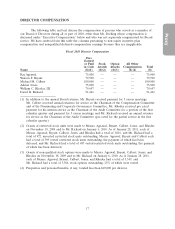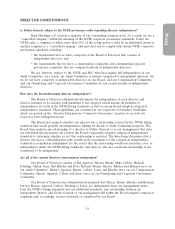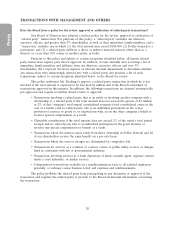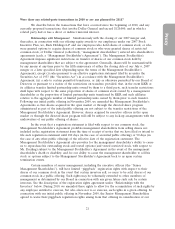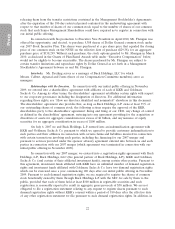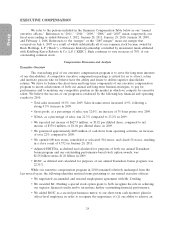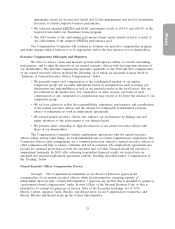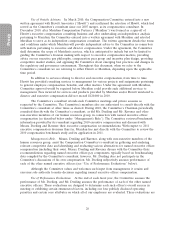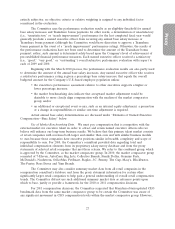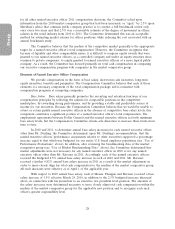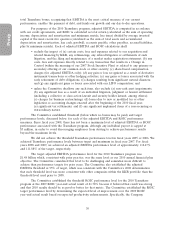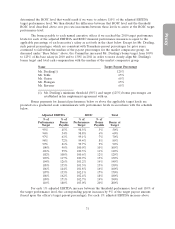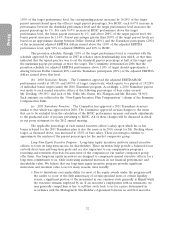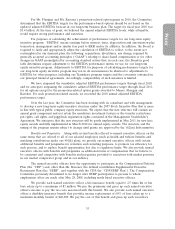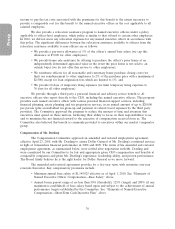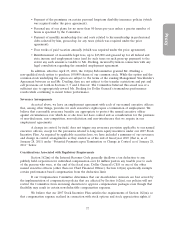Dollar General 2010 Annual Report Download - page 35
Download and view the complete annual report
Please find page 35 of the 2010 Dollar General annual report below. You can navigate through the pages in the report by either clicking on the pages listed below, or by using the keyword search tool below to find specific information within the annual report.
Proxy
entirely subjective; no objective criteria or relative weighting is assigned to any individual factor
considered in the evaluation.
The Committee uses the performance evaluation results as an eligibility threshold for annual
base salary increases and Teamshare bonus payments. In other words, a determination of unsatisfactory
(i.e., ‘‘unsatisfactory’’ or ‘‘needs improvement’’) performance for the last completed fiscal year would
generally preclude a named executive officer from receiving any annual base salary increase or
Teamshare bonus payment (although the Committee would have discretion to approve a Teamshare
bonus payment in the event of a ‘‘needs improvement’’ performance rating). Otherwise, the results of
the performance evaluations have not been used to determine the amount of the Teamshare bonus
payment; rather, such amount is determined solely based upon the Company’s level of achievement of
pre-established financial performance measures. Each named executive officer received a satisfactory
(i.e., ‘‘good,’’ ‘‘very good,’’ or ‘‘outstanding’’) overall subjective performance evaluation with respect to
each of 2009 and 2010.
Beginning with the March 2010 process, the performance evaluation results are also partly used
to determine the amount of the annual base salary increases. Any named executive officer who receives
a satisfactory performance rating is given a percentage base salary increase that equals the overall
budgeted amount for the Company’s U.S.-based employee population unless:
• the executive’s performance assessment relative to other executives supports a higher or
lower percentage increase;
• the market benchmarking data indicate that an upward market adjustment would be
desirable to more closely align compensation with the median of the market comparator
group; and/or
• an additional or exceptional event occurs, such as an internal equity adjustment, a promotion
or a change in responsibilities or similar one-time adjustment is required.
Actual annual base salary determinations are discussed under ‘‘Elements of Named Executive
Compensation—Base Salary’’ below.
Use of Market Benchmarking Data. We must pay compensation that is competitive with the
external market for executive talent in order to attract and retain named executive officers who we
believe will enhance our long-term business results. We believe that this primary talent market consists
of retail companies with revenues both larger and smaller than ours and with similar business models
to ours because those companies have executive positions similar in breadth, complexity and scope of
responsibility to ours. For 2010, the Committee’s consultant provided data regarding total and
individual compensation elements from its proprietary salary survey database and from the proxy
statements of selected retail companies that met these criteria. We refer to this combined group, which
is approved by the Committee, as the market comparator group. In 2010, the market comparator group
consisted of 7-Eleven, AutoZone, Big Lots, Collective Brands, Family Dollar, Genuine Parts,
McDonald’s, Nordstrom, OfficeMax, PetSmart, Staples, J.C. Penney, The Gap, Macy’s, Blockbuster,
The Pantry, Ross Stores and Yum Brands.
The Committee may also consider summary market data from all retail companies in the
compensation consultant’s database and from the proxy statement information for certain other
significantly larger retail companies to help gain a general understanding of overall retail compensation
trends. The Committee did not use such additional summary market data as reference points upon
which to base, justify or provide a framework for the 2010 or 2011 compensation decisions.
For 2011 compensation decisions, the Committee requested that Meridian obtain updated CEO
benchmark data from the same market comparator group to be certain the Committee was aware of
any significant movement in CEO compensation levels within the market comparator group. However,
27


